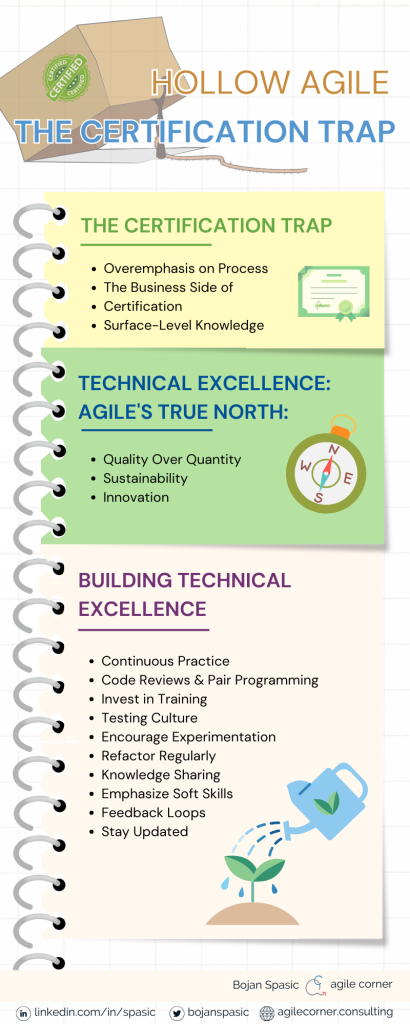
The Certification Trap: Is it Overshadowing the Real Essence?
Certifications often promise a structured approach to learning, but is there a hidden cost?
- Overemphasis on Process: While Agile is rich in its principles, why do many perceive it as just a set of rituals and ceremonies?
- Certification Business: With the Agile certification industry booming, one can’t help but ask: Is the emphasis shifting from genuine learning to merely obtaining a certificate?
- Surface-Level Knowledge: Certifications may provide foundational principles, but do they delve deeper into the practical challenges faced in real-world scenarios?
Technical Excellence: Isn’t it the True Essence of Agile?
Technical excellence is about more than just writing impeccable code; it’s about consistently and sustainably delivering value.
- Quality Over Quantity: It’s essential to focus on how well you deliver. High-quality products lead to satisfied customers and reduce long-term maintenance costs.
- Sustainability: With technical excellence at the forefront, teams can maintain a consistent pace, ensuring minimal accrual of technical debt.
- Innovation: Technically adept teams can innovate, ensuring products remain competitive and relevant.
Building Technical Excellence: How Can Teams Truly Achieve It?
Achieving technical excellence goes beyond following best practices; it’s about cultivating a mindset of continuous improvement, collaboration, and innovation.
- Continuous Practice: Encourage regular practice. Be it side projects, open-source contributions, or coding challenges.
- Continuous Code Reviews and Pair Programming: These ensure code quality and facilitate real-time knowledge sharing.
- Invest in Training: Beyond self-learning, organized sessions expose the team to new ideas. Expose team members to crucial concepts.
- Promote Testing: Make testing an integral part of the development process. Mandate achieving high degree of self-validating code, either through TDD or other test-first approach.
- Encourage Experimentation: New tools and methodologies can lead to innovative solutions.
- Refactor Regularly: Maintain a clean and manageable codebase.
- Knowledge Sharing: Fosters a sense of collective growth.
- Emphasize Soft Skills: Alongside technical prowess, skills like communication and teamwork are crucial. Teams are not groups of typists, but living high-performing and effective organisms.
- Feedback Loops: Shorten the time between any action and a feedback. Remember that feedback fuels growth. Implement systems for it.
- Stay Updated: With an ever-evolving tech landscape, continuous learning is key.
Conclusion
Technical excellence is a continuous journey of learning and adaptation. By valuing quality, fostering a growth mindset, and sharing knowledge, teams can navigate this journey, delivering unparalleled value every step of the way. Isn’t that what we all aim for?
